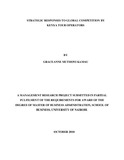| dc.description.abstract | The tourism industry is one of the largest and expanding industries in the world because of an increase in the interaction between different countries and the development of commerce and investment across borders (KATO Newsletter, 2006). Tourism industry is not immune to the influences of global competition which is characterized by the escalating mobility of capital, people, ideas and information on a universal scale. The tour operators who are a crucial link in the distribution chain, representing the central connection between customers and providers of tourism services, have been challenged to devise strategies that ensure flow of tourist in the country and succeed to compete with foreign tour operators to increase their business.
The study was conducted with the objective of establishing the strategic responses adopted by firms in the tour operators in response to global competition. The population of interest consisted of all tour operators based in Nairobi who are members of Kenya Association of Tour Operators (KATO). To meet this objective, a sample of 87 respondents was drawn from KATO's Membership list using stratified random sampling procedure and primary data collected using a semi-structured questionnaire. Data collected was analysed using frequency tables, percentages, bar charts and other statistical measures.
Findings of the study have revealed that various response strategies were quite important to tour operators in Kenya in responding to global completion. The strategic responses that ranked highly included restructuring the firms operation to ensure continued profitability, investment in information communication technology (ICT) to add value to products/services, investment in training and development programs for staff and forming co-operation, alliances and networks in areas such as technology, marketing, distribution, and human resource sharing to add value to products or services, maintaining an excellent public image, attaining reputation and brand development and maintaining competitive position. Expansion and opening of regional offices to coordinate tour activities seems to have been ranked the least. A check within the categories shows that most of the companies in category D to 'Associate' (7~/O) rated it quite lowly.
The study has managed to identify various differences and similarities among the six categories of tour operators' studied. The differences are reflected in the focus, goals and operations pursued by the companies in each category. Generally, those in category D to 'Associate' are more focused on growth and expansion of company operations, while those in categories C to A are more geared towards maintaining the right public image and forming co-operation, alliances and or networks in areas such as technology, marketing, distribution, and human resource sharing to add value to products or services attaining market leadership and maintaining profitability.
In terms of similarities, the study established that almost all the tour operators in their various categories are conscious of the need to enhance competitiveness as a tourist destination m view of competition posed by the emerging destinations, and the need to investment in technology communication technology (ICT) to add value to products and services. The study recommends that tour operators need to identify and employ to strategic responses that will promote their success and competiveness. Environmental analysis and strategic planning needs to be encouraged in all tour operators in category D to 'Associate' since these categories seemed to lag behind in responding to challenges posed by global competition.
The study also recommends a review by the Kenyan Government in regard to sustainable tourism in the country in view of other competing destinations and competition faced by tour operators in Kenya from foreign direct investment. In future, the study recommends an integrated study covering other players in the tourism industry like the hoteliers, parks and museums that would reveal more insights on how global competition has impacted the tourism industry. | en_US |

